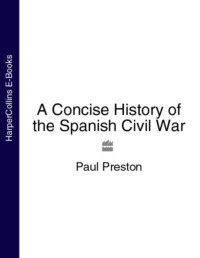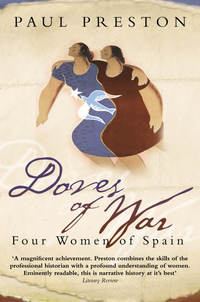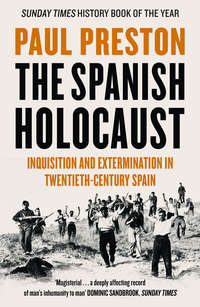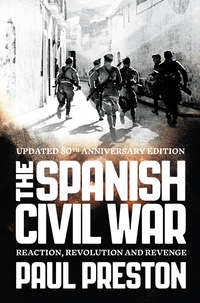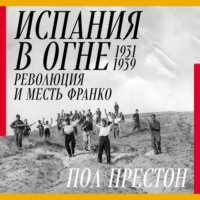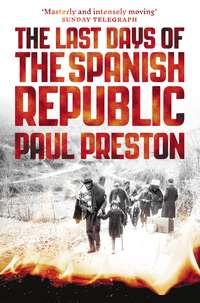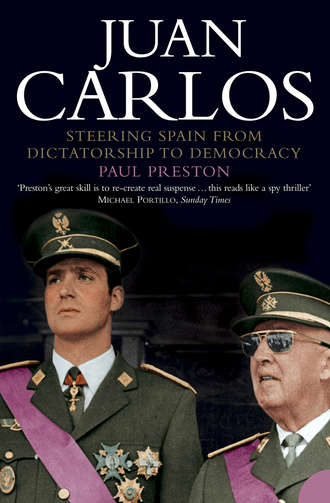
Полная версия
Juan Carlos: Steering Spain from Dictatorship to Democracy
The Soviet acquisition of the atomic bomb, the Chinese revolution and outbreak of the Korean War in June 1950 had increased Franco’s value in the eyes of the Western powers. On the other hand, the regime had suffered considerable domestic erosion as a result of the recent massive strikes in Barcelona and the Basque Country in March and April. Feeling that the scale of domestic opposition might have made Franco open to negotiation, on 10 July 1951, Don Juan wrote him a letter that would have enormous repercussions both for himself and his son. In it, he managed to squander years of sacrifice and opposition to the regime yet gain nothing in return. Franco was outraged by Don Juan’s comments about the ‘attrition’ inflicted on the regime by the strikes. Having blamed the strikes on foreign agitators, the Caudillo was even more annoyed by Don Juan’s suggestion that they were the consequence of the economic situation and government corruption. Franco had no interest whatsoever in Don Juan’s offer of a negotiated transition as a route that would allow him to consolidate his work within the stability of a monarchy that could unite all Spaniards. Don Juan’s letter achieved the worst of both worlds. On the one hand, it merely stimulated the venom of Franco, because it criticized his regime and insisted on the need for national reconciliation – an idea that was anathema to the Caudillo. On the other, Don Juan was abandoning his past championship of a democratic monarchy and accepting the Movimiento. Despite the unctuous intervention of Danvila, Franco rudely delayed replying for two months. His long letter on 14 September 1951 was both disdainful and cruel.
Franco simply ignored the offer of negotiation within the Movimiento, expressing in the most patronizing terms his outrage that Don Juan had dared to criticize him. The scale of insult was breathtaking. Accusing Don Juan of ‘ignorance of the Spanish situation’, and dismissing his comments on the economy as ‘inane’, the Caudillo brushed aside his criticisms of the conditions in Spain with self-satisfied references to the ‘indisputable triumph of Spain’s policy in the international media’. He claimed that he had selflessly committed Spain to the idea of monarchy, but built in safeguards against the dangers of hereditary monarchy throwing up an incapable heir: ‘Precisely because I consider the monarchical institution to be tied to our history and the best way to secure the revival and the greatness of our Fatherland, even though I was under no obligation to do so, I set the nation down that road and I recommended that Spain be constituted as a monarchy in the great plebiscite in which the nation unanimously endorsed the fundamental laws of the Fatherland. However, in so doing, I needed to guarantee the Spanish nation that the possible deficiencies of individuals would never bring about crises in our institutions as happened twice in the past’ – references to the collapse of the monarchy on 11 February 1873 and 14 April 1931.
Having claimed that the Ley de Sucesión elevated the institution of monarchy above the defects of the hereditary principle (that is to say, by leaving the choice of king in his hands), Franco went on, rather bizarrely, to suggest that there was no support for the monarchy in Spain and claimed that the only reason there was any hope for a monarchical future was because the Spanish people had listened, as he put it, to ‘the authoritative voice of he who gloriously led them in the Crusade and dexterously steered Spain through the stormy seas of the universal revolution in which we live’. Don Juan had referred to his efforts to join the Nationalist forces during the Civil War. Franco loftily scorned the idea that this constituted ‘identification with the Movimiento’. His outrage was evident in the statement that: ‘You are mistaken in thinking that the regime needs to seek a way out since it actually represents the stable way out of centuries of decadence. What other regime could have survived the harsh test of two wars and the international plot to which Spain was subjected?’
Regarding Don Juan’s allusion to ‘the historic laws of succession’, Franco rejected the hereditary principle, stating that the Ley de Sucesión made no a priori assumptions about ‘the dynasty or line with the best rights’. He went on to inform Don Juan of his hope that, ‘when the time comes, if it were in the interests of our Fatherland or even of the monarchy itself, you would follow the patriot path of renunciation, of which your august father gave an example when he abdicated his rights in favour of Your Highness, just as the King of Belgium has done recently or as the King of England did’. He raised this matter because, ‘a large number of Spanish monarchists, in the light of how your public acts are repelling great swathes of the country and undermining your good name, recognizing that the monarchy can come back only through the will of the Movimiento, begin to see in your renunciation in favour of your son a way, when the right time comes, of helping me perhaps to declare in favour of your dynasty, of your branch, when the dynastic problem is finally resolved.’ Thus, after this devastating bombshell – that even if Don Juan were to abdicate, there would be no guarantees for Juan Carlos – he made it quite clear that his concern was simply the continuity of the regime after his death. That being the case, the Lausanne Manifesto and subsequent evidence of Don Juan’s democratic proclivities had eliminated him as a possible successor.32
Utterly mortified by this letter, Don Juan cut off all communication with Franco for the next three years. During this time, the Caudillo decided on a strategy of encouraging the emergence of rivals to Juan Carlos and his father. This was to intensify the pressure on Don Juan, generally muddy the waters and diminish Falangist fears of an eventual Borbón restoration. In October 1952, through his Ambassador in Paris, the Conde de Casa Rojas, Franco approached Don Jaime, who, three years earlier, had reneged on his 1933 decision to renounce his rights to the throne. Franco had no difficulty in persuading the still impecunious Don Jaime that his son and heir, Alfonso de Borbón y Dampierre, should be educated in Spain, under the regime’s supervision. Don Jaime was enticed by the prospect of permanent freedom from debt through regular financial support from the regime as well as by the possibility of re-establishing his own, or at least his son’s, claim to the throne. Initially, Alfonso had no inclination to do what his father wished. His mother, Emmanuela Dampierre, had been estranged from his father long before they formally separated in 1946. Alfonso and his brother Gonzalo had been brought up by their mother, which effectively meant a life in boarding schools. Alfonso in particular resented his father. Nevertheless, he was even more deeply resentful at his penniless position, and in 1954 the now 18-year-old Don Alfonso finally accepted the plan and enrolled for a law degree at the Jesuit University of Deusto, in Bilbao.33
Meanwhile, Juan Carlos continued his education at Miramar. He was often homesick and looked forward to his holidays at Estoril. He admitted later to biting his nails as a result of his anxieties. Nevertheless, his four years at Miramar seem to have been reasonably contented ones. Originally, it was assumed that he would share a room with his brother but, because of the natural sibling rivalries between a 12-year-old and his younger brother, they ended up being separated, and Jaime Carvajal moved in with Juan Carlos. The routine at Miramar was harsh. The children had little time to themselves. They were woken each day at 7.30 a.m. with the ringing of a bell and required to go straight into the garden in order to hoist the flag. This was followed by mass and a sermon from Miramar’s chaplain. Only then would the boys have breakfast and begin their morning classes. At the end of the morning, there was a short break before lunch. Lessons resumed at 4 p.m., until another brief break in the evening, followed by supper and study time. Discipline was strict. On one occasion, when he had been given lines for some infraction, he said to the maths teacher, Carlos Santamaría, ‘When I’m King, I’m going to get so-and-so’ (a reference to the teacher who had punished him). ‘Not you. I’ll make you Chancellor of the Exchequer.’ The Prince had no doubts that one day he would succeed his father on the throne.
Aurora Gómez Delgado remembered Juan Carlos as an affable extrovert, who had his ups and downs like any ordinary boy, but who adapted easily to Miramar and was definitely not a ‘difficult child’. When Juan Carlos was free from other obligations, he indulged his passion for photography or played chess. He enjoyed playing football and got into quarrels like other boys, but he was also very conscious of his status: ‘He knew perfectly well that he was there in order to learn his profession.’ In fact, Juan Carlos was, according to his French teacher, capable of showing an unusual degree of self-restraint when necessary, never allowing himself to cry in public. Juan Carlos also manifested a keen desire to talk to people of all walks of life, a taste that he was able to indulge during the weekend outings. None of the children at Miramar had much pocket money, and Juan Carlos was no exception. On occasions, the young Prince would write letters taking advantage of both the horizontal and the vertical space, so as to save paper.34
In a 1995 interview, Juan Carlos’s mother suggested that Juan Carlos and his brother Alfonsito had always got on well. However, it is noteworthy that neither Juan Carlos himself nor those, like his French teacher, who recorded their memories of Miramar, had anything to say about the relationship during their time together there.35 Aurora Gómez Delgado was however very aware of the deep attachment that Juan Carlos felt towards his mother. She telephoned him often from Estoril. When he was told that she was on the line, he would run down the corridor shouting, ‘Mummy, Mummy!’ Of Juan Carlos’s relationship with his father at this time, the French teacher hinted at its stiff formality when she said only that, ‘In addition to giving him fatherly advice, he behaved towards him as a friend.’ There seems to have been a regular correspondence with his parents throughout his stay. The tone was loving if rather formal. Curiously those from Don Juan were somewhat more affectionate, ending, typically, ‘Until the next, my beloved sons, with a big hug from your loving father,’ or, ‘With greetings to your teachers and classmates, and a hug for Alfonsito, and another for you with the love and affection of your father Juan.’ Those from his mother were slightly more stilted – ‘Goodbye, beloved children, hoping to see you soon, if God wills. A big hug from your Mummy who blesses you both. María.’36 All things considered, Juan Carlos’s four years at Miramar were relatively happy ones marred only by separation from his family and by attacks on his father in the press.
Franco had always given vent to his antipathy towards Don Juan through his total control of the Spanish press. Arriba and other Movimiento newspapers were free to make regular insinuations that the monarchists were disloyal to the regime. In January 1954, the hostility reached new heights. In December 1953, Don Juan’s close friend and second cousin, Lord Mountbatten, at the time Admiral of the NATO Mediterranean fleet, had invited him to observe from the flagship major manoeuvres planned for January 1954. As an honorary Royal Navy officer, Don Juan was keen to accept. On the other hand, with tension growing between Britain and Spain over Gibraltar, he feared that the Movimiento press would distort the reasons for his presence and link anti-monarchist with anti-British propaganda. In the event, on the advice of Gil Robles, who reminded him that this was a NATO operation, he decided to attend. As had been expected, a hostile press campaign was unleashed in which the NATO dimension was totally ignored. The manoeuvres were presented as a threatening gesture by British naval forces and it was implied that Don Juan was selling out to London over Gibraltar. ‘Don Juan de Borbón in the Royal Navy. The French press reveals that Don Juan de Borbón has arrived in Malta where he has boarded the twelve-thousand-ton cruiser HMS Glasgow, from which he will follow the English manoeuvres in the Mediterranean. Don Juan de Borbón has been an honorary lieutenant in the Royal Navy since 1936.’ This ‘news item’ was accompanied by an editorial which described the manoeuvres as an outrageous provocation intended to remind the people of Spain that: ‘Gibraltar is the thorn that has kept blood flowing since the iniquitous theft of 1704.’ The pupils at Miramar followed the entire affair in the press. Juan Carlos was inevitably distressed and, for a time, it appeared as if the school might have to be closed down.37
By the summer of 1954, Juan Carlos had completed his secondary education. Shortly afterwards, Don Juan received two assessments of the boy’s character. The first was sent by Jesús Pabón y Suárez de Urbina, the distinguished monarchist historian who had chaired the board (tribunal) before which the Prince faced his oral examinations. The second came from the Conde de Fontanar, a close friend of Don Juan and a man free of personal political ambition. As father of Jaime Carvajal, the Prince’s room-mate at Miramar, and having frequently welcomed the Prince as a guest in his home, he knew Juan Carlos well. The contrasts between these reports were illuminating. Pabón wrote: ‘The impression that Juan Carlos produces and leaves behind him is of being, fundamentally, kind.’ Fontanar went into more detail, describing the Prince as: ‘generous, affectionate, biddable, kindly, unassuming, incapable of bearing a grudge, likeable, courageous, good-looking and with an aptitude for physical exercises’. Fontanar also underlined the fact that the Prince ‘treats ordinary folk with simple affability’. Pabón noted Juan Carlos’s ‘genuine lack of pretence’.
Having seen Juan Carlos only in this formal setting, as a teacher examining him, Pabón naturally noted his nervousness and insecurity, and photographs of the boy from this period substantiate the professor’s conclusions. Pabón wrote: ‘The Prince is naturally shy and, like all shy people, he over-compensates for his shyness by reacting with a certain vehemence and even violence in his expressions, his gestures or his words.’ Pabón saw the Prince’s younger brother Alfonsito as being altogether more uninhibited and spontaneous, partly because of his great natural intelligence and also because he did not live weighed down by responsibilities. For Pabón, the cure for Juan Carlos lay in the acquisition of greater self-confidence. That, of course, was something in which his father could play a part, but Don Juan had a tendency to be critical and off-hand with his son.
For Fontanar, the problems with the Prince lay elsewhere. He had had far greater opportunity to observe the boy in his own home alongside his own son Jaime, who was academically outstanding. Like other observers of the schoolboy in Fribourg and at Las Jarillas, Fontanar perceived a degree of indiscipline – which may well have reflected a natural strength of character or a minor rebellion against the constant separations from his family. Contrary to the pious reflections of his teachers (made when Juan Carlos was King), Fontanar noted that the Prince had no interest in culture and read little, not even the press. At times, he complained, the boy seemed thoughtless, selfish and superficial. Accordingly, for Fontanar, what was required was to imbue him with a greater sense of duty.38 Time and the boy’s circumstances would take care of that.
The completion of the Prince’s secondary education raised the question of where he would be sent next, since both Don Juan and Franco saw the decision as a weapon in their ongoing trial of strength. Already in the spring, Don Juan had discussed with Gil Robles the possibility of sending Juan Carlos to the Catholic University of Louvain in Belgium. Convinced that he had to differentiate the line of the monarchy from that of the Franco regime, Don Juan sent Gil Robles to Louvain in May to prepare the way.39 Nevertheless, as Pedro Sainz Rodríguez pointed out, and Don Juan knew only too well, if acceptable terms could be negotiated, it made more sense for the Prince to be educated in Spain. Sainz Rodríguez advised Don Juan that Franco needed the Prince in Spain and could be manoeuvred into paying a price – a publicly acknowledged interview that would strengthen the image of the crown inside Spain. Thus advised, Don Juan threw down the gauntlet in a note sent to Franco on 16 June 1954. In it, he informed the Caudillo of his decision to send his son to Louvain. Juan Carlos later told his authorized biographer, the monarchist playboy José Luis de Vilallonga, that Don Juan was also toying with the idea of sending him to the University of Bologna.40
Coincidentally, when Don Juan’s letter reached him, Franco was already engaged in composing a memorandum in which he outlined an elaborate scheme for the Prince’s future education. Through the pompous language and cynical remarks could be discerned elements of common ground. Ignoring the fact that he was secretly encouraging the claim to the throne of Don Jaime and his son, Franco wrote that Juan Carlos: ‘must prepare himself to be able, when the time comes, to deal with the duties and responsibilities involved in the leadership of a nation’. He claimed to be offering Don Juan a recipe for success based on ‘thoughtful reflection on the conditions in which a Prince should be educated and the baggage of knowledge that is required today by the ruler of a nation if he is to awaken the respect, the trust and the love of the people that must sustain him’. His letter left no doubt that, if Juan Carlos were not educated in Spain and within the ambience of the Movimiento, he would never be allowed to ascend the throne. Moreover, various cruel asides about those who would probably never reign and about the ‘shipwreck of the monarchy’ made it clear that Don Juan did not figure in Franco’s plans.
The Caudillo’s scheme for the Prince’s education was expressed in his inimitably grandiloquent and florid style. First, his philosophic and moral education would be assured by ensuring that he had at his side ‘a pious, prudent person devoid of ambition’. Then, the Caudillo announced that for discipline and the moulding of his character, there could be ‘nothing more patriotic, pedagogic and exemplary than his formation as a soldier in a military establishment’. This would mean a two-year period at the Zaragoza military academy, followed by shorter six-month periods in the Air Force and Navy academies. Then there would be two years at university studying politics and economics followed by three months each at the Schools of Agronomy, Industrial Engineering and Mining. This lengthy programme was to be adorned by regular contact with the Caudillo himself. Interestingly, he stated that: ‘I consider it important that the people get used to seeing the Prince next to the Caudillo.’ The letter was followed by a detailed – and revealing – summary of those aspects of the curriculum that Franco considered crucial. Needless to say, there was considerable stress on Franco’s own interpretation of Spanish history and on the principles of the Movimiento.41
Don Juan’s letter of 16 June arrived before this lengthy missive was sent and Franco therefore added a substantial postscript. Hurried and repetitive, its hectoring and threatening tone suggested that Don Juan’s dart had hit its target. The constantly reiterated themes were that sending Juan Carlos abroad was not ‘convenient’ – presumably for Franco – and would cause a bad effect (for Don Juan). It was increasingly obvious in Franco’s communications with Don Juan that, in the Caudillo’s mind, what was at stake was not whether Don Juan should come to the throne but only whether Juan Carlos might do so. The unmistakable threat was directed against Juan Carlos. By implication, Don Juan had no future: ‘You don’t seem to appreciate the national mood and the damage that will be done to the political future of the Prince if he is removed from being educated within the thinking of the Movimiento.’42
While this correspondence was wending its way between Portugal and Spain, Juan Carlos and his brother Alfonso had gone to Madrid for the end-of-year examinations which led to Pabón’s report. With the permission of Don Juan, they made a courtesy visit to El Pardo on 22 June to thank Franco for facilitating their time in Spain. The Caudillo ordered that the occasion be given massive publicity in the press. According to a French journalist, at the next cabinet meeting, Franco announced that: ‘The two most important events in the history of Spain since 1939 are the signature of the agreements with the United States and the visit that the Infantes made me on 22 June.’ He went on to comment that, ‘One day Juan Carlos will be called upon to assume high responsibilities in the life of Spain.’43
Although urged by Gil Robles to send his son to Louvain, Don Juan was reluctant to see him educated outside Spain. However, he needed a bargaining chip in order to ensure that, if it was to be in Spain, it would be more on his terms than those of the Caudillo. Despite the outrageous way in which it simply brushed aside Don Juan’s rights as father of Juan Carlos, much of what Franco suggested made good sense for the education of a future King of Spain. The danger was, as Sainz Rodríguez pointed out, that, ‘the Prince will be definitively distanced from Your Majesty and will end up having a Franco-Falangist education.’ However, the emphasis on the principles of the Movimiento aside, much of Franco’s plan accorded with what Don Juan had in mind. In any case, as Pabón commented, ‘to fight the bull, you have to stay in Spain.’44 Nevertheless, Don Juan took his time replying, letting it be known that Franco’s proposals were being submitted to the members of his Privy Council – a body containing several individuals whom Franco loathed. Most of those consulted realized that Franco’s plan for the Prince signified the end of Don Juan’s hopes of ever gaining the throne. Some, including Gil Robles and General Antonio Aranda, voted in favour of rejecting Franco’s proposal, but the majority were in favour. This process was completed by the end of July. However, Don Juan waited until 23 September 1954 before responding to Franco. He used the excuse that he had been on a cruise of the Greek Islands organized by Queen Frederica of Greece. As a publicity stunt to foster tourism in Greece, she had arranged to bring together the younger generation of several European royal families. Don Juan’s letter was sent from Tangier where Juan Carlos had just had an emergency appendectomy.
It was during the cruise, while on board a Greek destroyer, that Juan Carlos met his future wife, Sofia, the daughter of King Paul and Queen Frederica. Nothing came of this first meeting. Years later, Juan Carlos would relate how, the first time they met, the 15-year-old Sofia told him that she was learning judo. On hearing this, Juan Carlos said jokingly, ‘That won’t be much use to you, will it?’ at which point she replied, ‘Is that what you think? Give me your hand,’ and proceeded to throw him to the floor.45 While sailing back from the cruise, Juan Carlos began to complain of stomach pains, which turned out to be appendicitis. Without his mother’s prompt reaction, he might have suffered a possibly fatal peritonitis. Whilst the crew insisted on keeping the Prince warm, Doña María de las Mercedes, who had been trained as a nurse, remembered that, in the case of appendicitis, the affected area had to be kept cold with ice cubes. Don Juan’s yacht, the Saltillo, put in at Tangier, where Juan Carlos was operated on at the Red Cross hospital by Alfonso de la Peña, a renowned Spanish surgeon who, luckily, happened to be in the town when they arrived.46
In the letter to Franco written in Tangier, Don Juan referred to himself ‘as a father conscious of his duty’. This was a clear indication of his annoyance at Franco’s attempt to usurp his role. His pique was evident too in the way that he deliberately ‘misunderstood’ Franco’s scheme. With a dig at Franco’s status, he expressed his satisfaction that: ‘The view of Your Excellency, who is currently responsible for the government of Spain, agrees, essentially, with my own that it is entirely fitting that Don Juan Carlos receive a Spanish, religious and military education.’ By deliberately sidestepping any reference to the Prince’s education within the principles of the Movimiento, Don Juan was provoking the Caudillo. Franco pointedly delayed more than two months before replying. It seems never to have occurred to him that he would not be able to bend Don Juan to his will. On 2 October, he confidently told his cousin Pacón, head of his military household, ‘Don Juan Carlos will be prepared for entry into the Zaragoza academy; and even though he won’t have to undergo examinations, he should have some idea in mathematics, so as to be able to carry out his studies there on a reasonable basis.’47 In the event, the young Prince would not get off so lightly.


